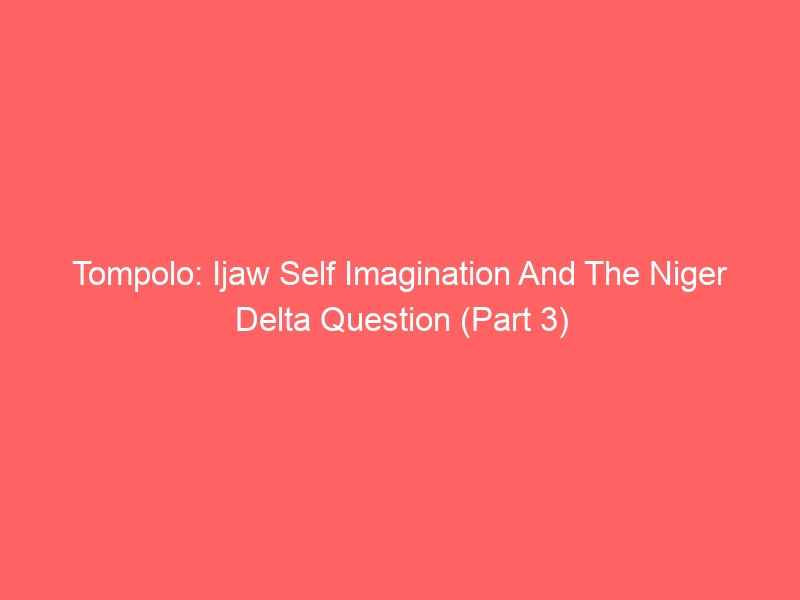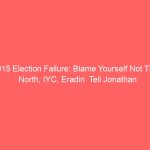Continuation of last edition
The MEND idea stated that the theatre of struggle against the pollution and degradation of the environment would not only be confined to political issues alone. For indeed, it would also be staged in the arena of economics, education and culture. The originating MEND document stressed the necessity of uniting the cultural with the educational and environmental struggle. And of course the proposed establishment of a Nigerian Maritime University, the remediation efforts in Ogoniland and the nascent cultural over reach of the Olu of Warri to some Ijaw Royals seen largely in the Olu sending cultural representatives to the investiture ceremony of the Gbaraun II, Aketekpe, Agadagba, the Pere of Gbaramatu Kingdom, and in the Itsekiri Royal emissaries and cultural troupe also visible in the Burial ceremony of Pa Thomas Ekpemupolo the Tunteriwei of Gbaramatu, a vicarious casualty of the brigandage of an overzealous soldier of the Nigerian State who stamped on Him in the event of the callous invasion of a sleepy and civil kurutie town, in the least stood out as some of MEND’s apocalyptic envisionment.
With the advent of MEND, a protest culture that pervaded the oil River struggle was converted into a resistant culture. Whereas the predominant mode of a plethora of fractious group in the region before this era, was a condition of protest, it was MEND that gave birth to the better organized platform of resistance. The protest culture prevaricated on simply making a statement of disapproval, but did not go beyond that. It addressed itself to the oil companies and to the State, with a view to appealing to their conscience. It was therefore a culture of complaint, of weeping and of self pity. It did not offer any solution beyond the depiction of the inhumanity of the degradation of the environment in passive forms. This was the nature of the copy catyism and pietism of the protest in the Niger Delta from 1960 reaching into the last decade of the 20th century. This nature of protest culture only stiffened the resolve of the Government and its multinational collaborators to do what it liked. They invaded the court systems and easily obtained court orders which coalesce communities to a condition of docile acceptance of the status quo. In most cases, staff of offices and spurious giftings in kind became tools in the hands of the oil overlords and the Government to manipulate and pacify the culture of armed dissent to its megalomania. We saw, in the case of Ken Saro Wiwa a notable son of the Niger Delta, the brutal, extra judicial, highly repellent murder in the guise of a handed down Court verdict through a compromised judiciary.
MEND was a philosophy of resistance rather than of protest. With it came the signature indent of Tompolo. I am not too sure Tompolo deliberately avoided going to Court on being summoned by the Nigerian State, The precedence set by the Government in handling other oil resistant causes, may have helped him conclude that there was a prejudgement of his alleged infractions by the Government. For me, and as an activist, I really think so, that it would have amounted to foolhardiness to voluntarily submit to an enemy who is both a Law and punishment officer. Of course, in more sense than one, Tompolo is more righteous than those pillaging Him. He belongs to a different age from the present, when politics has become commercialized, and tribalism, graft, and corruption, arrogance of power and inordinate delight in debilitating concupiscence seem to be the main inspiration of public men in Nigeria and many parts of Africa but the issues MEND fought for, and of their courage and deprivation, are issues that are likely to be with us many years to come. Indeed, for as long as the prospect of infrastructures and better life for the communities in the oil prospecting area is dimmed by the big lies of the trans national oil corporations and bourgeois democracy- government of money for money, and like I said somewhere else in this paper, in any society where a Governing elite, faced with wide social inequality, mass poverty, unemployment and conspicuous waste of limited national resources resorts to a systematic denials of its earlier commitment to make good on its promises to the people, such an elite is bound to be challenged by a frustrated younger generation that is eager to vindicate the correct perspective. Herein lies the relevance of the confrontation between the Government and the MEND and by an overreach its leader Tompolo. We cannot readily then accept the premise that because you say ‘no’ to the Government on plaintive issues of equity and fairplay especially in a Nation that can no longer cater for its people, you are branded a militant.
Exactly who is a militant? I urge that we address ourselves dispassionately, not fantasize, not simply project an answer to reflect our escapist desperation. A militant is one who skirmishes incognito, through some hideous smokescreen, to create a future tarnished and devalued by a succession of incontinent, irresponsible decisions. He is decked in both civilian and military outfits, but mostly of the military. He is the one who assails the reinforced pillar of civilized society such as justice, to buy through a black market of judicial miscarriage a bouquet of immunity to cover for his dangerous and criminal past.
He is defined, not only by his uniform, but by his uniform arrogance, his unbridled rapacity and his uninformed propensity for sterile interventions. Are there no others? Of course there are, and because they tend to lack open identification, they are especially dangerous. But we do know them, and so do you. They are the ones who, even while claiming to defend the rights and entitlements of their own constituencies, do little more than defend the rights and entitlements of their privileged existence. They are the generator contractors in whose interest it is that the national electric system never works. They are the minority who conspire to run down the health system of the nation, since they can divert its allocation to their own and their families’ excursion to Jeddah for lesser Hajj and fly to London to treat a buzzing ear. They are the ones who systematically destroyed the educational system to the point that there are some University graduates that cannot make a simple sentence and you wonder how they are able to be found worthy in character and in learning.. They are the petroleum moguls and long-haulage monopolists who have ensured that this nation has never enjoyed the cheapest form of transport ever invented by humanity – the railways.
They are the ones who see government solely as livelihood, and who engage in every dirty trick in the books to ensure that government remains in their hands since they know of no other way to survive, they have never understood that a nation’s economy must be generated, not printed at the Central Bank or simply diverted from the oil wells and central handouts, These enemies were the inventors of the Rice and Cement Importation Scheme, the Import Licence Scheme, the Counter Trade and numerous other scam schemes that were designed not to generate productivity and ensure employment for generations, but to amass, in the hands of a few, the entire wealth of the nation, from which they dole out pittances to a zombie followership. And as Wole Soyinka pitifully dispose in his numerous transpose on the State of the Nation which is apt in my denotation of who a militant is- ‘For this minority, serving a constituency means, not the elevation of the social condition of their people, but the enclosure of such a constituency within the walls of dependency. The sense of existence of such leaders is fulfilled only if, on sauntering out of their homes, they are surrounded by a constituency of beggars. Their self-fulfillment lies only in the non-fulfillment of their immediate, impoverished community’
How does MEND differentiate from this theatrics of descriptions on our political space? The MEND’s philosophy went beyond protest. The new approach of resistance no longer places the onus on the transnational corporations to prove their humanity. It no longer attempted to appeal to the conscience of the Government. It addressed itself directly to the people, with the view of mobilizing the people to fight against their perceived short changers. Not only did this new philosophy propagate messages of liberation, it agitated for actions on the part of the people to change their own situation. You see this in the response of the youths, market women, artisans and many deck hand workmen, to stand up against the military each time they enter communities of the oil River looking for MEND proponents. In this caravan of contradictory tragedies, it is not improbable that the people shield their liberators from the State whom the State refer to as militant. What a paradox of juxtaposed roles?
Tompolo and his troupe in the MEND did not only move the agitation from a protest form to that of challenge and resistance, He was a hands on activist who established practical community based projects. Indeed, Tompolo went beyond moaning and whinging about the plight of his Ijaw people, he made his hands dirty with the soil of the Land, building Health care Delivery centers and running them. He was reputed through his foundation to have renovated the Okerenkoko Cottage Hospital long abandoned by the Delta State Government and directly paid for Consultants and Doctors and other medical personnel, from his pocket, who were reputed to have done over three hundred mini, medium and major surgeries for a recurring period of three years., Tompolo had also renovated a good number of Schools in many oil river communities and provided them with necessary infrastructures and kits to aid educational pedagogy. He embarked upon raising science teaching awareness by providing incentives to Science teachers to improve on their competence and to generate interest in science based subjects. He facilitated mass housing developments in the area and was said to have built several jetties around fishing shanties to aid mercantilist ventures for the fishing communities. He also built many communal gardens as in Oporoza, kokodiagbene, and many communities. In this way, he hopes to inculcate values of self reliance and self development in addition to self esteem, self respect, and self confidence. He was in the process of building his MIEKA Diving Institute to cater for oilfield services and create job outlets for over a Hundred thousand Nigerians when the NIMASA a regulatory Agency under the FMOT, came asking for a facility to commence the Nigerian Maritime University- the same facility that has become the subject of a cumbersome litigation and farcical proceedings which spurious, doubtful and premature irientation, ensured Tompolo is not here today to slam the gavel on his birthday return celebration.
The other question of how to rein in the Ijaw self-imagination in their struggle and the contradictory hypnosis of the affliction of betrayals will make the final push to close this paper. In the haze and hype of social integration, and the dialectically linked benefits and misfortunes of capitalist modernity the Ijaw ethnic character must define itself especially in its history and relations with other ethnic nationalities group as part of its collective memory. Its interaction as that of an assertive ethnic people acting on its own environment must resonate within the shadow and complexes into which its history has been assumed as a people ‘without agency, always acted upon’. I have often said you cannot create a history out of the pettiness of a distorted worldview. You cannot use judicial overreach, of course in these parts it has become highly probable to obtain favorable verdicts through the backdoor of pecuniary settlement to define history. History cannot be assumed in the eyes of the writer of History. History is event etched in human sophistry, denoted in oral traditions, folklores, and other incidental memories used to store history. You cannot as a rule frame history to justify occupation or ownership of geographical entities. History evolves as a sense of community and cannot evaporate by any guise of the word or by any direct bid to truncate its essence, its existentialism or progressive thought. Yes, History sets the general outcomes of Laws because its conclusion holds a great many instruction for posterity. But it is a time tested truth that without History there can be no people, without History, written or unwritten, there can be no community, and without community, all talk of ethnic nationalities character is vain. Nations are built on the palpable operations of community of thoughts; otherwise they are empty, artificial and hollow. They collapse with the tiniest pinpricks of unrest, they drift into oblivion with the slightest winds of external pressure.
As a student of History, I have taken time to look at the various historical characters that have tended to shape the course of History of the Niger Delta peoples. I have long catalyzed my knowledge of the varying events from the rich tons of material juxtaposed as history of the Niger Delta. I have looked at the different scholarships of the different explorers that came to the coastal littorals of the Niger Delta for their own trade interest designed to pivot their search for exportable commodities. Of course you will expect the histories collated for the peoples and tribes of the oil River they had trade contact with to reflect that interest. I have also read Prof. Obaro Ikime’s book on the ‘Groundwork of Nigerian History’ which I describe as a fair attempt at explaining what happened but considered it to be too subjective and conventional, and numerous other learned efforts. But I come down with one observation, that the best source of preserving and writing history is the people and their traditions, for in their traditions one is able to fathom the course of historical discourse and to whittle down distortions in the sequence of the rendering of its history so as to achieve in the minimum, the quotient of characters and event that make History. The Ijo nation, as an integral part of world history, I suppose has already supplied materials for its history which cannot be convoluted under any guise of domestic hegemony. Tompolo whom we have come to honour today is among the great gallery of people, whose works and devotion, have helped to write that History and to a reasonable degree impacted those beyond the native shores, which makes it possible for us to talk about the possibility of a new phenomenon which has tended to dethrone the mindset that has previously instructed our collective memory. I mean to say the sort of History that canvasses that it was Mungo Park that discovered the mouth of the River Niger. I would ask who discovered the nose as if human history is a tapestry only understood in terms of organic calculations.
I do not refer to History merely as a product of domestic conquest. I do not insist that once the process of origin is not understood then it must derive strength from a string of anarchy that is designed to expand on new frontiers of territories. No, I refer to that far more fundamental, unobtrusive, but nonetheless comprehensive seizure of a peoples being. Some peoples group are wise enough to acknowledge their state of incompletion, and take steps – even while the business of daily complexes remain uninterrupted – to tackle this essential business head on, addressing the very history that brought them into being and examining the factors – both positive and negative – that have shaped their existence since they began to recognize, and conduct themselves as a people. Others muddle on, immured in an impenetrable feat of a somewhat superior approbation. They list their history in terms of aristocratic dividends, in terms of the primacy of arguments between original inhabitants and intrusion of His Majesty‘s army that is easily known and read on the hinges of history of other cultural peoples as proof of the claim that they own so much of what exist where and where, and can confidently assess themselves as viable, contiguous and refined, beyond the mere naming. They refuse to recognize that some at least – not necessarily all but some part – of a suppressed social malaise or cultural fractiousness can be traced to the basic issue of the domestic aspect of their self-constitutive process. This includes those who cannot boast of even these medals of achievement, those who, long after any self-respecting cultural people should have been weaned, continue to insist that their endemic negative symptoms are merely “teething problems.” Such peoples and their assumed histories are clearly on a self-destruct trajectory.
To be continue…
Being a paper presented by Prof. Tosan Harriman at the 46th birthday Anniversary Lecture of High Chief Government Oweizide Ekpemupolo, Ibe Ebidouwei of Ijaw nation on Wednesday 12th April, 2017












